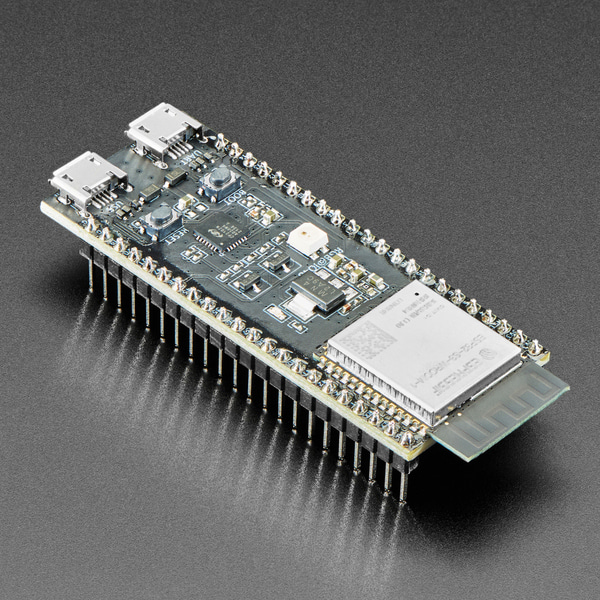ESP32-S3-DevKitC-1-N8R8 개발보드
(ESP32-S3-DevKitC-1-N8R8
- ESP32-S3-WROOM-1 - 8MB Flash 8MB PSRAM)

개요
- 본 제품은 ESP32-S3-DevKitC-1-N8R8 개발보드 입니다.
- WiFi/BLE를 지원하는 ESP32-S3-WROOM-1 MCU칩을 탑재하고 있는 제품입니다.
- PCB 안테나를 가지고 있으며, 8MB 플래쉬, 8MB PSRAM을 지원하는 제품입니다.
특징
-
Components:
- ESP32-S3-WROOM-1: ESP32-S3-WROOM-1 is a powerful, generic Wi-Fi + Bluetooth LE MCU module that has a rich set of peripherals. It provides acceleration for neural network computing and signal processing workloads. ESP32-S3-WROOM-1 comes with a PCB antenna.
- 5V to 3.3V LDO: Power regulator that converts a 5V supply into a 3.3V output.
- Pin Headers: All available GPIO pins (except for the SPI bus for flash) are broken out to the pin headers on the board for easy interfacing and programming. For details, please see Header Block.
- USB-to-UART Port: A Micro-USB port used for power supply to the board, for flashing applications to the chip, as well as for communication with the chip via the on-board USB-to-UART bridge.
- Native ESP32-S3 USB Port: ESP32-S3 full-speed USB OTG interface, compliant with the USB 1.1 specification. The interface is used for power supply to the board, for flashing applications to the chip, for communication with the chip using USB 1.1 protocols, as well as for JTAG debugging.
- Boot Button: Download button. Holding down Boot and then pressing Reset initiates Firmware Download mode for downloading firmware through the serial port.
- Reset Button
- USB-to-UART Bridge: Single USB-to-UART bridge chip provides transfer rates up to 3 Mbps.
- RGB LED: Addressable RGB LED, driven by GPIO48.
- 3.3V Power On LED: Turns on when the USB power is connected to the board.
문서
- Datasheet
-
The ESP32-S3-DevKitC-1 is an entry-level development board equipped with ESP32-S3-WROOM-1, a general-purpose Wi-Fi + Bluetooth LE MCU module that integrates complete Wi-Fi and Bluetooth LE functions. This version is equipped with the ESP32-S3-WROOM-1 (PCB antenna) with 8MB Flash and 8 MB PSRAM.
Please note: The S3 is similar to the ESP32-S2 - but adds a dual core and Bluetooth LE (not classic!) However, there is minimal support for this dev board. For example, as of the time of this writing, there is no Arduino or CircuitPython support - only ESP IDF! Please purchase if you're doing development with the S3, and OK with stuff not working 100% out of the box.
Most of the I/O pins on the module are broken out to the pin headers on both sides of this board for easy interfacing. Developers can either connect peripherals with jumper wires or mount ESP32-S3-DevKitC-1 on a breadboard. We particularly like that there's a debug UART/USB port and a separate native USB port, so you can upload/debug/USB all at once.
At the core of the modules is an ESP32-S3 series of SoC, an Xtensa® 32-bit LX7 CPU that operates at up to 240 MHz. You can power off the CPU and make use of the low-power co-processor to constantly monitor the peripherals for changes or crossing of thresholds. ESP32-S3 integrates a rich set of peripherals including SPI, LCD, Camera interface, UART, I2C, I2S, remote control, pulse counter, LED PWM, USB Serial/JTAG controller, MCPWM, SDIO host, GDMA, TWAI® controller (compatible with ISO 11898-1), ADC, touch sensor, temperature sensor, timers, and watchdogs, as well as up to 45 GPIOs. It also includes a full-speed USB 1.1 On-The-Go (OTG) interface to enable USB communication
There are three mutually exclusive ways to provide power to the board:
- USB-to-UART Port and ESP32-S3 USB Port (either one or both), default power supply (recommended)
- 5V and G (GND) pins
- 3v3 and G (GND) pins